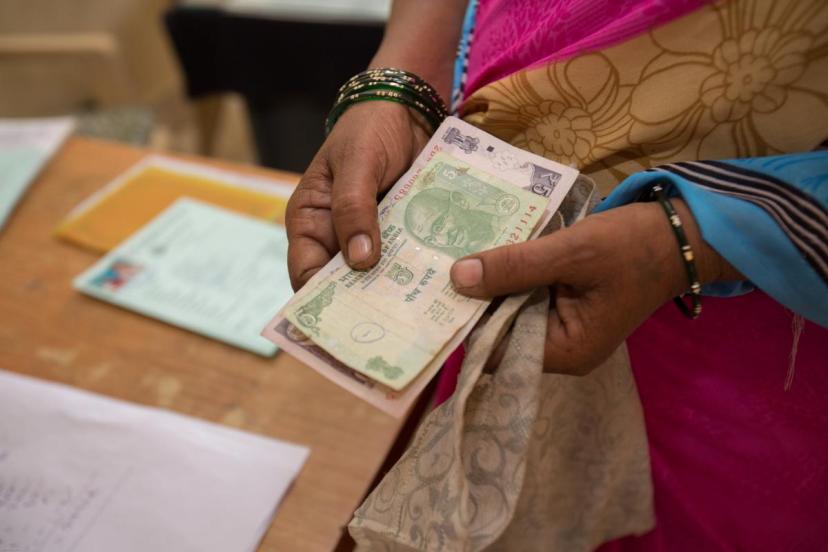It has been observed in most cases that women usually feel less confident in handling finances. They are often conditioned into depending on their fathers, brothers, sons, and even male friends when it comes to figuring out financial decisions.
This could be anything starting from simple everyday activities like using online payment methods, dealing with the bank, or managing family expenses, to even more specific things like investments, understanding stock markets, starting new business ventures, or studying finance.
There is also a lack of financial awareness in girls from a younger age, whereas their male counterparts automatically and inherently seem to ‘know more’ about finances, economics, and businesses. To understand the larger consequences of this, it is important to first trace the roots of why financial exposure is meted out less to women as opposed to men.

From a very young age, girls in most families are seen to be given lesser financial responsibilities when compared to their male siblings. Money handling is usually looked after by the father or the male head of the family. This responsibility is then eventually passed down to sons.
What is usually seen even in modern, educated families is that although girls are now encouraged to gain financial independence, they seldom have the autonomy or financial literacy to handle their own money. Many women seldom own a bank account in their own names, despite earning money.
Money-making is a pursuit that is seen to be mostly male-dominated. With the lack of educational resources and awareness, most girls, although motivated and hardworking, are underrepresented in finance sectors, as compared to their male counterparts.
Financial literacy, therefore, becomes one of the biggest factors that contribute to an eventual gender gap in financial pursuits, employment, and pay.
Women in professional finance courses and business schools
Beginning from primary courses in commerce or finance, women are much less exposed to this field of education as compared to men. Business school barriers eventually lead to an underrepresentation of women in professional courses.
Participation in financial activities like business ventures, investments, and other economically diverse career choices eventually become distant prospects for women. Their financial illiteracy is what makes them feel intimidated by commercial career concepts which automatically makes economic advancements in their profession a hassle
Law schools and medical schools have, on the other hand, reported a good rise in the representation of women professionals. Yet, in the case of business schools, women have still not reached the mark.
One of the biggest driving factors that can inspire women to opt for business schools is notable female alumni and female role models in business and finance. Unfortunately, an absence of sufficiency in that area too can be cited as a factor behind why a lesser number of women choose business and finance as their professional careers.
Also read: Where Are All The Women In Governance And Public Finance?

Gender inequality in business ventures
Participation in financial activities like business ventures, investments, and other economically diverse career choices eventually become distant prospects for women. Their financial illiteracy is what makes them feel intimidated by commercial career concepts which automatically makes economic advancements in their profession a hassle.
Stemming from a lack of skills and knowledge in aspects that are required in financial jobs, recruitments for women naturally do not open up as much. Some valued skills that are good for going ahead in financial prospects include analytics, accountancy, information technology, communication, and more.
In most observations of these skills, women are most likely to take up communication skills than change movement skills, which is likely to be opted more by men.
These affect the overall placements of women in professional financial and business sectors because most of the CEO or leadership positions are occupied by men. Even when men and women begin their careers in finance maintaining parity, the C-suite eventually gets dominated largely by men.
MBA programs also show only a small percentage of women in finance faculties in the topmost business schools despite statistics showing some shrinkage of gender gaps. Private equity firms and business ventures too show as less as 10 percent of women bearing senior roles, and all of this stems from more or less the same reasons.
To usher a change in this scheme of things, concepts related to finance should be exposed and made accessible to women from a younger age. What we must recognise is that finance is not just about money-making. It is about developing a discerning conscience to build and handle money. Financial literacy and autonomy are important to every individual, especially women and minorities
According to a study by the National Association of Women Business Owners, the U.S has 11.6 million women who own businesses. Sadly, this only accounts for 39 percent of the country’s private-owned firms, and 8 percent of the national employment.
With existing conditions like these in first-world countries, it is natural for women to bear its impact in other countries like India, where opportunities, as well as outcomes, are averse.
All these factors combined lead to gender inequality while paying. An underrepresented workforce and a workforce lacking in substantial financial literacy eventually lead to a massive gap that remains invisible to many eyes.

This gender pay gap often goes unacknowledged by even big companies and it is blamed on the credibility of women while the real problem lies in the existing socio-political system of women being underexposed to financial sectors.
To usher a change in this scheme of things, concepts related to finance should be exposed and made accessible to women from a younger age. What we must recognise is that finance is not just about money-making. It is about developing a discerning conscience to build and handle money.
Financial literacy and autonomy are important to every individual, especially women and minorities. Therefore, they must be equipped with the information and opportunities to streamline their financial knowledge and skill sets.
Also read: Women And Finance: The Pandemic Has Seen A Promising Rise In Female Investors
About the author(s)
Mrittika is a student of English. She is usually found expressing her love for art through words and music. At other times she is most likely traveling around the town trying new delicacies and imagining her life as a Greta Gerwig movie




